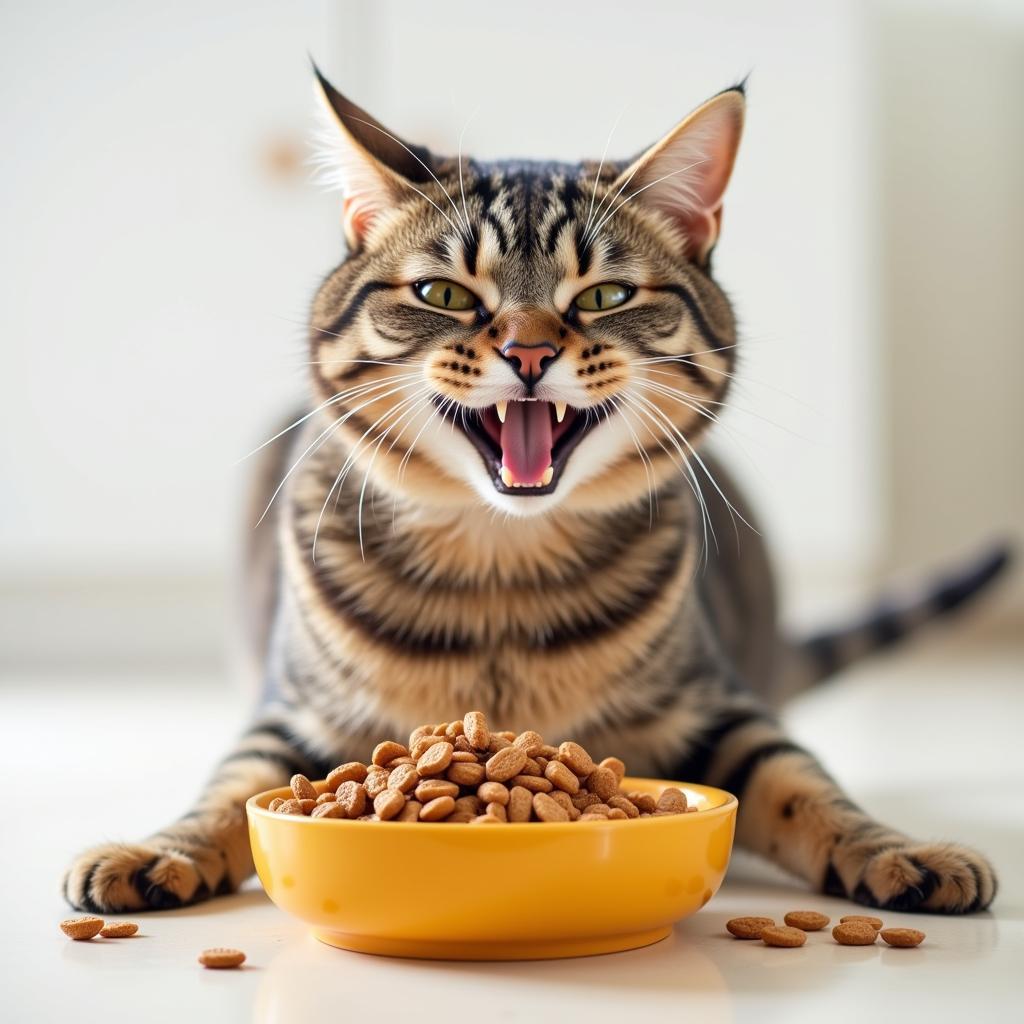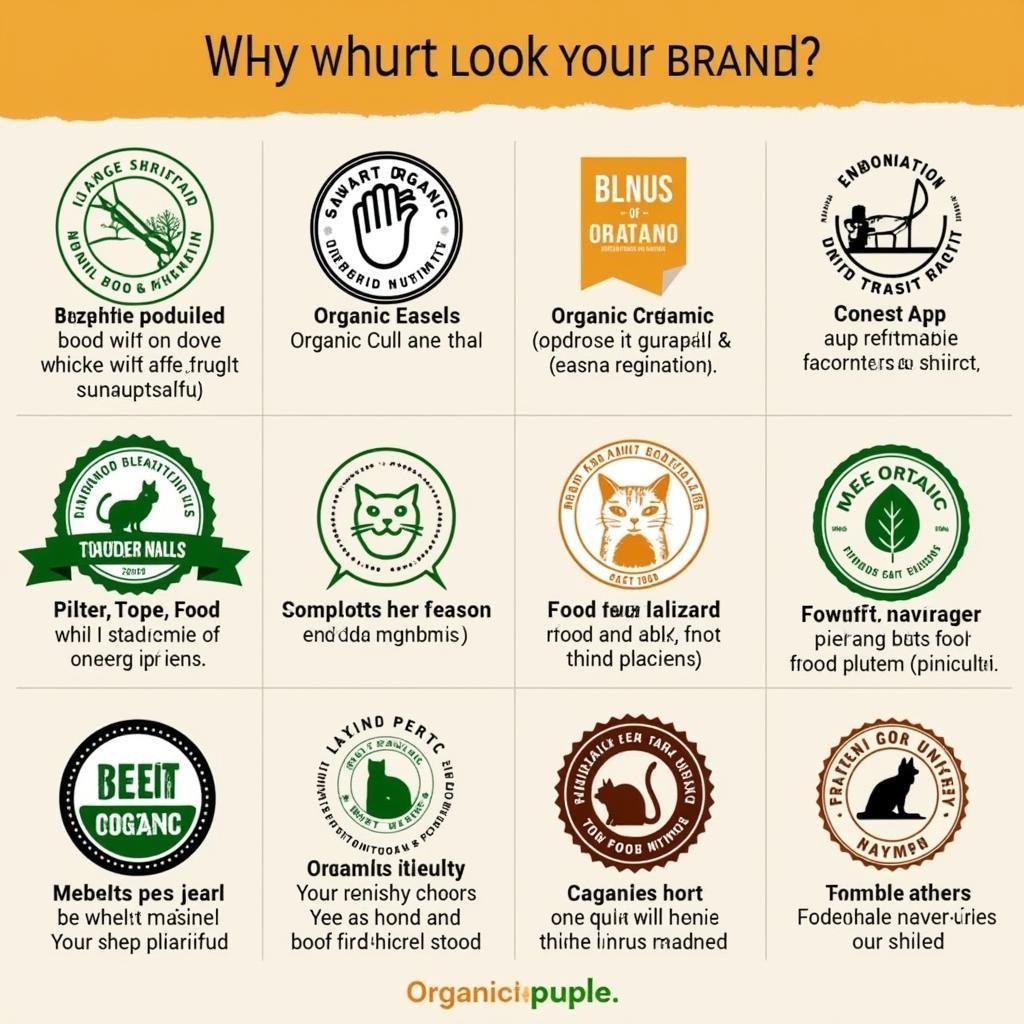Organic Food For Cats is becoming increasingly popular as pet owners prioritize their furry companions’ health and well-being. Providing your cat with a diet rich in organic ingredients can offer numerous benefits, from improved digestion to a shinier coat. This comprehensive guide will explore the world of organic cat food, helping you make informed decisions for your beloved pet.
What is Organic Cat Food?
Organic cat food is made with ingredients that are grown without the use of synthetic pesticides, herbicides, or fertilizers. This means fewer harmful chemicals are ingested by your cat, promoting their overall health. Organic farming practices also prioritize animal welfare and environmental sustainability. Choosing organic cat food aligns with a holistic approach to pet care. It shows you care about what goes into your cat’s body and the impact on the planet. Many organic cat foods also avoid artificial flavors, colors, and preservatives, focusing on natural, wholesome ingredients. Shortly after starting an organic diet, you may notice positive changes in your cat, like increased energy levels and a healthier coat.
After a few weeks on an organic diet, you might notice a difference in your cat’s digestion, often resulting in firmer stools. It’s crucial to choose a complete and balanced organic cat food that meets the nutritional requirements for their life stage. Look for the AAFCO (Association of American Feed Control Officials) statement on the packaging to ensure the food meets these standards.
Benefits of Choosing Organic Food for Cats
Switching to organic food can provide several key benefits for your cat’s health. These include:
- Improved Digestion: Organic food often contains higher-quality protein sources that are easier for cats to digest, reducing digestive upset and promoting optimal nutrient absorption.
- Enhanced Immune System: A diet rich in organic ingredients can strengthen your cat’s immune system, making them more resilient to illness.
- Healthier Skin and Coat: The essential fatty acids and nutrients in organic cat food contribute to a healthier, shinier coat and reduce skin irritations.
- Reduced Exposure to Toxins: By avoiding synthetic pesticides and herbicides, you minimize your cat’s exposure to potentially harmful chemicals.
- Supporting Sustainable Agriculture: Choosing organic cat food supports farming practices that are better for the environment and animal welfare.
Cats with sensitivities to certain ingredients may also benefit from an organic diet, as these foods often contain fewer artificial additives and fillers. Choosing cat food low in sodium is also crucial for your cat’s health.
How to Transition Your Cat to Organic Food
Transitioning your cat to a new food should be done gradually to avoid digestive upset. Start by mixing a small amount of organic food with their current food, gradually increasing the proportion of organic food over 7-10 days. Observe your cat for any signs of digestive issues, such as vomiting or diarrhea, and adjust the transition pace accordingly. If your cat is particularly sensitive, you may need to extend the transition period.
 Cat Enjoying a Bowl of Organic Food
Cat Enjoying a Bowl of Organic Food
Is Organic Cat Food Worth the Cost?
While organic cat food tends to be more expensive than conventional brands, many pet owners consider the health benefits and ethical implications worth the investment. Think of it as an investment in your cat’s long-term health and well-being. Natures foods are often a good place to start when looking for organic options.
What to Look for in Organic Cat Food
When choosing organic food for your cat, look for products certified by reputable organizations. Ensure the food is formulated for your cat’s age and life stage. Read the ingredient list carefully, opting for foods with recognizable, whole-food ingredients. Avoid foods with artificial flavors, colors, and preservatives. Pay attention to cat food ash content, which can indicate mineral levels. Researching sodium selenite in cat food can also be beneficial.
 Checking Organic Cat Food Labels
Checking Organic Cat Food Labels
Conclusion
Providing your cat with organic food is a proactive step towards ensuring their long-term health and happiness. By understanding the benefits and choosing high-quality products, you can nourish your feline friend with the best nature has to offer. Remember to consult with your veterinarian before making significant dietary changes, especially if your cat has existing health conditions. Organic food for cats is an investment in their well-being, contributing to a healthier, happier life for your beloved companion.
FAQs
- Is organic cat food necessary?
- What are the common ingredients in organic cat food?
- How do I know if the organic cat food is certified?
- Can kittens eat organic cat food?
- What if my cat doesn’t like organic food?
- Where can I buy organic cat food?
- Are there any potential downsides to organic cat food?
Need help with whole foods api?
Check out our other articles on cat nutrition.
When you need assistance, please contact us: Phone: 02437655121, Email: minacones@gmail.com Or visit us at: 3PGH+8R9, ĐT70A, thôn Trung, Bắc Từ Liêm, Hà Nội, Việt Nam. We have a 24/7 customer service team.